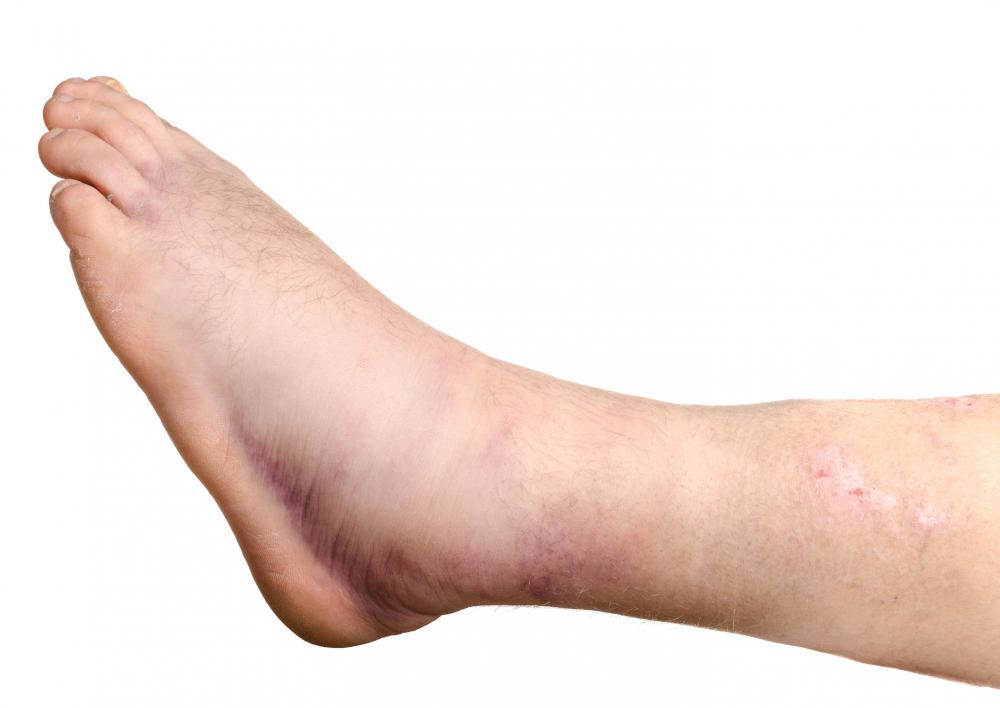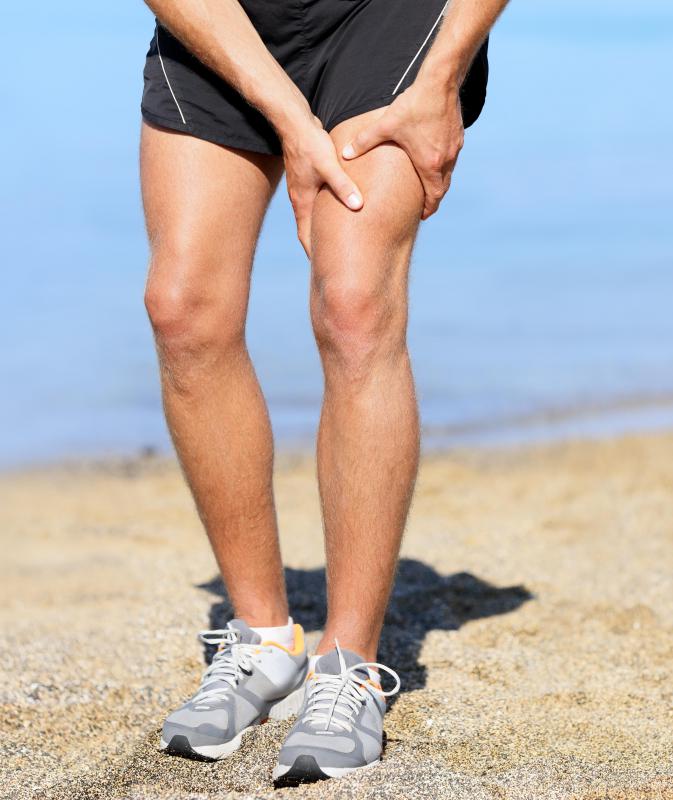At TheHealthBoard, we're committed to delivering accurate, trustworthy information. Our expert-authored content is rigorously fact-checked and sourced from credible authorities. Discover how we uphold the highest standards in providing you with reliable knowledge.
What are the Common Causes of Swelling in One Leg?
Swelling in one leg is most often either the result of a clot blocking the blood flow, an injury in a person's leg, or inflammation from arthritic conditions. There are also some cases in which swelling in one leg might be caused by water retention, which could signal major organ failure. In most cases, swelling in a single leg isn’t as serious as two swollen legs, but if the single leg is swollen because of a blood clot, it can be very serious, as can swelling from water retention in the rare cases when it only affects one leg.
In a typical situation, swelling in one leg usually means that the problem is somehow centered inside that leg. That could potentially be a good or bad thing. Usually a swollen leg is just a sign of injury. If a person hurts his leg by pulling a muscle, or falling and bruising it, a little bit of swelling can be considered normal.

In many cases, swelling in one leg can also be caused by arthritis in the knee joint or the ankle. This is a serious condition that can be debilitating if it isn’t treated. Arthritis can cause severe damage over time because it can eat away at an individual’s cartilage, which can make it harder and harder for someone to get around. Arthritic pain in the knees, ankles, and hips is especially serious because it can limit mobility.

Another serious cause of swelling in one leg is a blood clot inside the leg. This will sometimes cause a lot of other symptoms, such as pain and a noticeable lack of feeling or blood flow in that leg. In other cases, it may be more subtle and difficult to detect. In either situation, the blood clot can be life threatening. The main danger is the possibility that the blood clot will break free and damage another major organ while traveling through the blood stream.

Water retention is one of the most common causes of swollen legs, but it usually causes both legs to swell. Sometimes there may be slightly unequal swelling, with one leg being noticeably bigger than the other. When that happens, a person may think that only one of his legs is swollen because it looks that way to the naked eye. Water retention can be a serious danger because kidney, heart, and liver failure are all possible causes. It is generally considered wise to consult a physician to be sure it's not water retention or a clot if there is any significant leg swelling.
AS FEATURED ON:
AS FEATURED ON:















Discussion Comments
My right leg is bigger than the left. It used to be quite common in the bad old days. The cause was the development of large muscles that were need to kick-start the now classic motorcycles.
It sounds like you have a Baker's Cyst. I had one something similar and it is usually caused by some type of injury and the fluid builds up into a bubble in your calf. It to be needs drained, you need to go to a doctor, they will give you a shot of cortisone and the drain it. Research it on the internet. That will help.
I have had severe swelling in one leg since 2006. I have been to numerous doctors and no one can seem to find out why. It's painful and swells extremely bad, even if I'm only standing on my feet for five minutes. The swelling never seems to go away, but standing for any length of time, only makes it worse. Does anyone else have anything similar?
I crashed on my motorcycle today and it landed on my leg. My thigh is swollen and hard. It doesn't hurt that bad but I cannot bend my knee all the way back to my bottom. I have ice on it but should I ice and heat or just ice. Should I go to the hospital?
I have severe swelling in both legs. I started having pain and weakness in both my knees over a month ago. I had X-rays done, which didn't show anything, but over a year ago, I had an MRI on my left knee due to pain, and the MRI showed arthritis and cartilage deterioration. I'm worried and confused about why both my legs are swollen. Also my ankles, feet and knees are swollen, along with me having sharp, shooting pains in my knees down to my feet. I told my doctor and she didn't even examine me. She looked and said I need a doppler done.
I just want to know what is wrong. I'm so scared. I can barely walk. Somebody please help me. I need all the opinions and advice I can get.
I think you should go see your doctor or go to the ER. It could be a blood clot or a narrowed blood vessel.
My right knee started to swell. There was a lot of pain mainly around the knee area. I now walk with a limp in my right leg and this is visibly larger than my left.
About two months ago, I woke up with my right thigh all swollen. Over a week, the swelling went down but I have a lump on my thigh that has not gone away. Anyone know what this could be?
Swelling in legs and feet also afflicts people with diabetes, high blood pressure, obesity and pregnancy.
I experience it because of diabetes but I have friends who have experienced it in the past because of obesity and high blood pressure.
I actually have swelling in both legs. But one is very slight and the other is very apparent. My doctor has linked it to diabetes and the circulation problems it leads to over time. I guess my circulatory system is unable to pump all the fluid away from my legs as it should.
The swelling goes down usually at night or when I rest and keep my feet up. It gets worse during the day when I'm standing.
@burcinc-- It could be a muscle injury, but I think you should go to the hospital immediately to rule out DVT. DVT stands for deep vein thrombosis, it's when a blood clot forms in a deep vein in the leg. It usually happens in one leg and will cause swelling in that leg.
I'm not a physician, so I have no idea if that initial pain you experienced is usually seen with DVT or not. But my husband had DVT and he went to the hospital immediately. The doctor was very happy that we went in without wasting time. He said that with DVT, there is always the risk that the blood clot will travel and obstruct blood vessels in organs like the lungs. It can cause serious complications like the article said if it isn't treated.
So when there is swelling in one leg only, I think it's best to have it checked out. Better safe than sorry!
While at work today, I felt a sudden sharp pain in my right calf. Shortly afterward, that leg started to swell, mostly around the calf down to the ankle and up to my knee. It's also painful, especially while walking.
I'm home now and have applied ice to the area and I'm resting. But there doesn't appear to be a decrease in the swelling. It looks the same to me.
What should I do? Do you think the swelling is due to a pulled muscle or something similar?
I don't feel that it's bad enough to visit the hospital but it is definitely odd. Any suggestions?
Post your comments